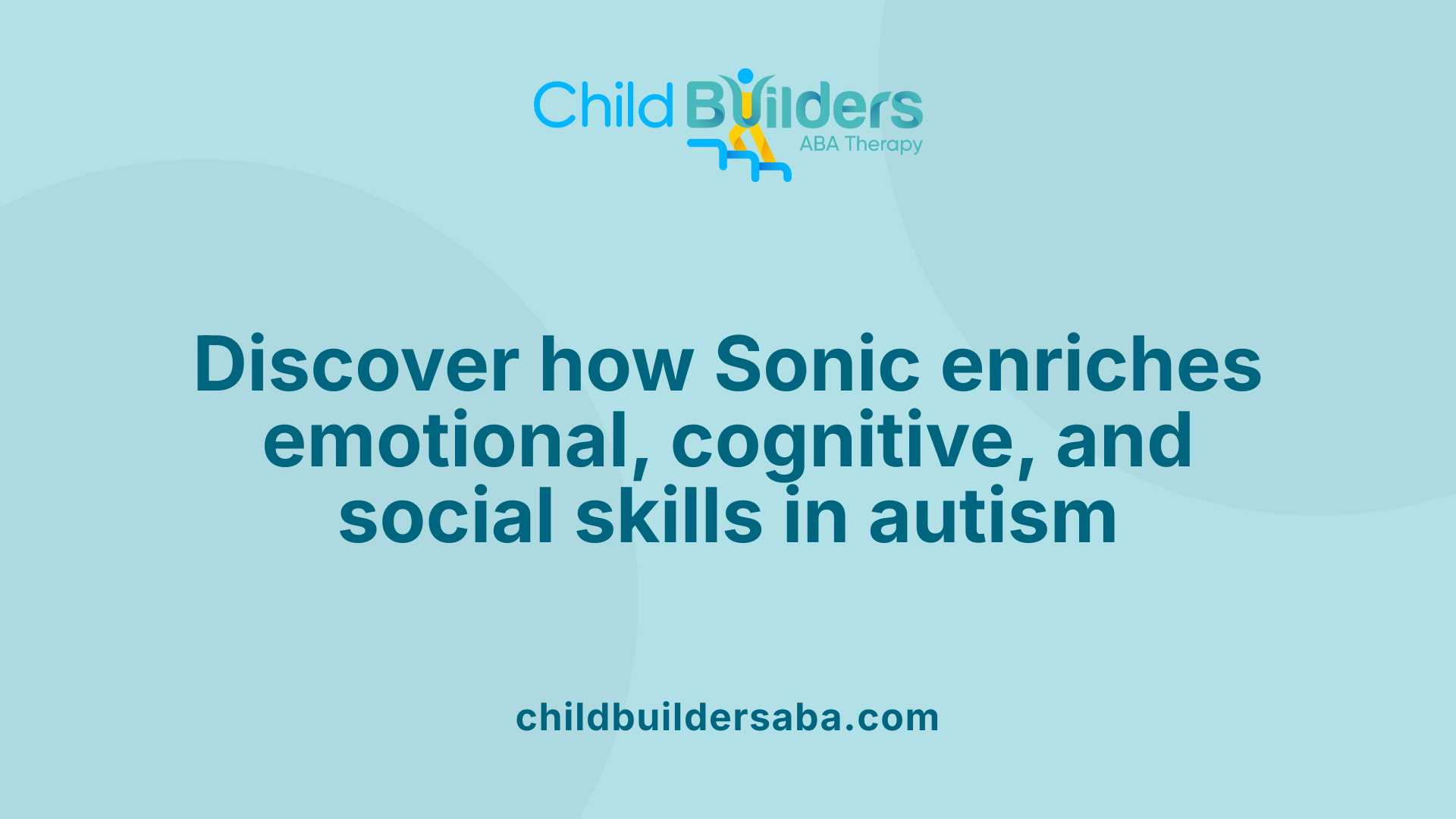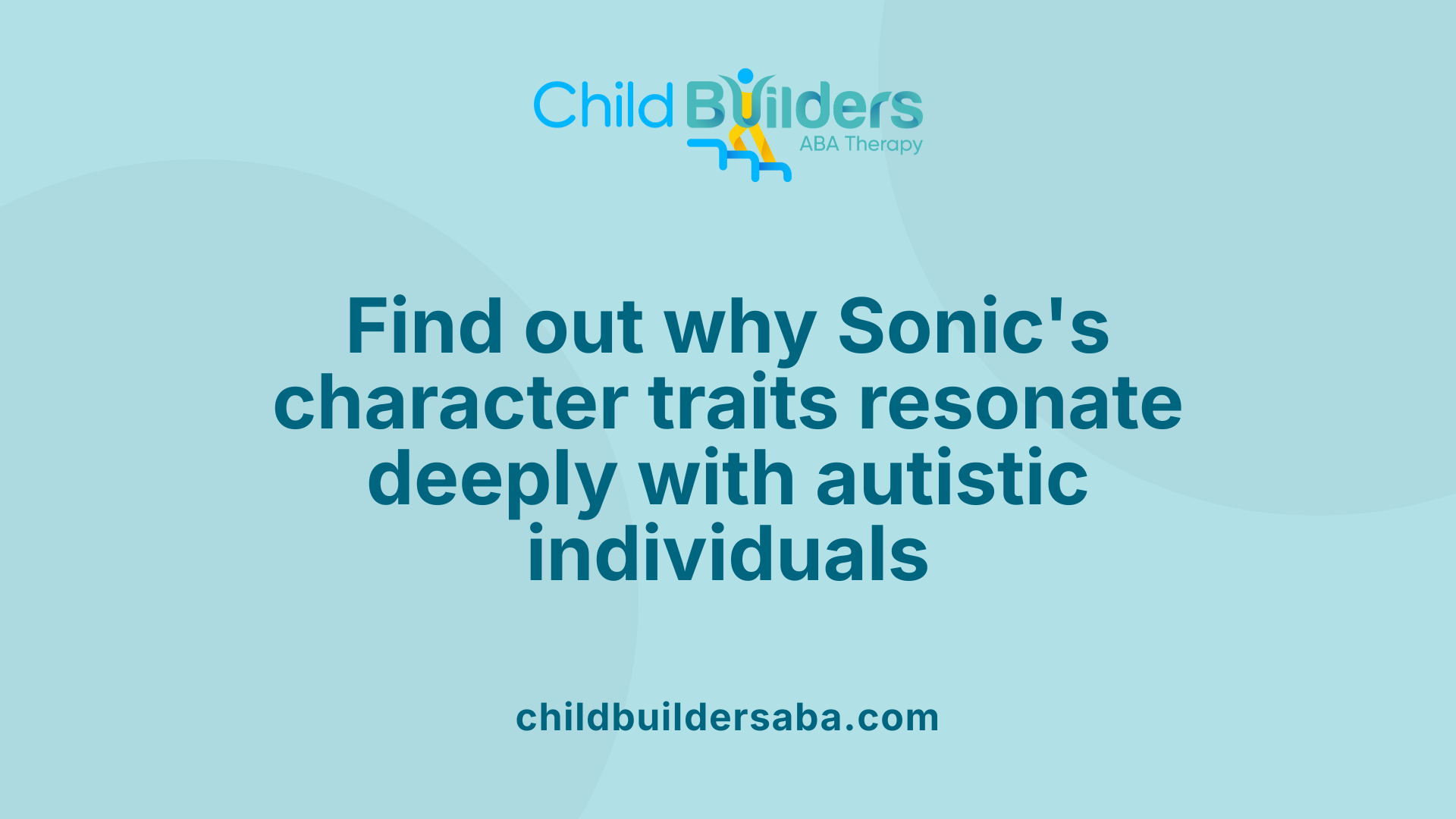Why Do Autistic People Like Sonic?

Understanding Sonic’s Significance in Autism Spectrum Interests
Sonic the Hedgehog’s popularity among autistic individuals has sparked curiosity about the reasons behind this affinity. From sensory appeal to thematic resonance, this article explores why Sonic is more than just a video game icon for many on the autism spectrum, serving as a source of comfort, engagement, and community connection.
The Foundations of Special Interests in Autism
How are special interests, like Sonic the Hedgehog, significant in the lives of autistic children and adults?
Special interests are a defining feature of many autistic individuals, providing them with joy, satisfaction, and a sense of purpose. One notable example is Sonic the Hedgehog, which resonates deeply due to its rich storytelling, diverse characters, and engaging gameplay.
The appeal of Sonic goes beyond entertainment. Many autistic fans identify with Sonic’s personality traits such as determination and resilience. These qualities inspire and mirror qualities valued within the neurodiverse community.
Moreover, the Sonic universe offers sensory stimulation through vibrant visuals and energetic sounds. This sensory engagement can be both stimulating and comforting for autistic players.
The structured nature of Sonic games—predictable, consistent, and rule-based—creates a sense of control and safety. This predictability helps autistic individuals feel more at ease while exploring complex environments or solving puzzles.
Engaging deeply with Sonic can also support cognitive skills including memory, attention to detail, problem-solving, and strategic planning. Additionally, such interests promote emotional regulation, helping individuals manage stress and anxiety.
Sharing a common interest like Sonic can foster social connections. Whether through online communities or shared play, it creates opportunities for communication and enhances feelings of belonging.
Lastly, Sonic’s story and characters can serve as sources of inspiration, boosting self-esteem and resilience. For many on the spectrum, mastering or discussing such interests helps build confidence.
| Aspect | Description | Additional Benefits |
|---|---|---|
| Sensory Stimulation | Vibrant visuals and sound effects enhance sensory input | Improves sensory processing |
| Routine & Predictability | Structured gameplay offers comfort | Reduces anxiety |
| Cognitive Development | Memory, attention, and problem-solving skills | Supports learning and independence |
| Emotional Support | Stress relief and emotional regulation | Promotes well-being |
| Social Connection | Community sharing and communication | Builds social skills and confidence |
In sum, Sonic and similar interests serve as vital tools in supporting emotional, cognitive, and social development for autistic individuals, offering joy, purpose, and a window into self-understanding.
Sensorial and Visual Engagement in Sonic

How do the visual elements in Sonic the Hedgehog appeal to autistic individuals?
Sonic's universe is renowned for its vibrant graphics and dynamic colors. These bright visuals captivate the eye and provide stimulating sensory input that many find enjoyable. The lively environments and colorful characters create an engaging atmosphere that can evoke excitement and joy.
What role do auditory features such as music and sound effects play?
An energetic soundtrack and engaging sound effects are integral parts of the Sonic experience. The fast-paced music and lively sound design enhance the sensory experience, making gameplay more immersive and stimulating. For many autistic fans, these auditory elements add to the sense of fun and emotional engagement.
How does sensory stimulation from Sonic serve as both enjoyable and comforting?
The combination of vibrant visuals and energetic sounds offers sensory stimulation that can be both exciting and soothing. The consistency and predictability in Sonic’s universe—such as familiar game mechanics and recurring characters—provide a sense of control. This predictability helps reduce anxiety and offers comfort, making Sonic an ideal special interest.
Impact on emotional and cognitive well-being
Interactions with Sonic's rich visual and auditory cues support emotional regulation and stress relief. For many autistic individuals, engaging with Sonic can foster relaxation, joy, and a sense of achievement. In addition, this sensory engagement can promote cognitive development, improving attention to detail, problem-solving, and strategic thinking.
| Sensory Element | Description | Benefits |
|---|---|---|
| Visuals | Bright graphics, vibrant colors | Stimulates visual senses, enhances mood |
| Sound | Energetic music, fun sound effects | Boosts auditory skills, creates immersive experience |
| Consistency | predictable game design, familiar universe | Provides comfort, reduces anxiety |
Overall, Sonic’s visual and auditory features create a sensory-rich environment that many autistic individuals find enjoyable and comforting, supporting emotional well-being and cognitive growth.
Predictability and Routine as Comforts

How are special interests, like Sonic the Hedgehog, significant in the lives of autistic children and adults?
Special interests such as Sonic the Hedgehog play an essential role by offering structure, joy, and a sense of mastery. For many autistic individuals, these interests provide a focused avenue for emotional regulation and a way to find comfort amid sensory and social challenges. Sonic's vibrant visuals, energetic sounds, and consistent storytelling create an engaging yet predictable environment that aligns with their need for routine.
The importance of predictable gameplay
The structured nature of Sonic games helps establish expectations. Players quickly learn the patterns and mechanics, which reduces anxiety caused by unpredictability. Knowing what to expect in gameplay offers reassurance and strengthens concentration.
Consistency in game design and storylines
Sonic’s universe maintains familiar characters and themes across its titles. This consistency ensures that players experience a sense of continuity, helping them develop a routine that fosters emotional stability and confidence.
How routine provides emotional stability for autistic players
Routine activities, like playing Sonic, support emotional well-being by creating predictable daily or weekly habits. Repeated engagement with Sonic games reduces uncertainty and can give a calming effect, especially in stressful situations.
Benefits beyond gameplay
Engaging with Sonic offers cognitive benefits such as improved memory, attention to detail, problem-solving, and strategic planning. These skills are valuable for daily functioning and personal development.
Social aspects
Sharing a common interest like Sonic encourages social interaction, whether through online communities or collaborative gaming. This fosters a sense of belonging and improves communication skills.
| Aspect | Description | Example |
|---|---|---|
| Sensory Stimulation | Visual and auditory features create engaging, predictable environment | Vibrant graphics, energetic music |
| Routine & Predictability | Provides emotional stability through structured activities | Repeating levels, familiar storylines |
| Cognitive Development | Enhances memory, attention, and problem-solving skills | Solving game puzzles, strategic gameplay |
| Emotional Regulation | Supports stress relief and emotional control | Calming effects during gameplay |
| Social Connection | Promotes communication and shared interests | Discussing favorite Sonic games online |
By aligning gameplay with predictable elements, Sonic serves not only as entertainment but also as a therapeutic tool. Its consistency helps autistic individuals find comfort, build skills, and foster social bonds, proving its value beyond mere recreation.
Cognitive and Emotional Benefits of Sonic Engagement

Enhancement of memory, attention, and problem-solving skills
Engagement with Sonic the Hedgehog offers various cognitive benefits for autistic individuals. The vibrant visuals and energetic sound effects stimulate visual and auditory senses, helping to improve attention and focus. The game's structured, predictable gameplay encourages players to recognize patterns, strategize, and solve problems, thereby boosting memory and critical thinking skills. Repeating levels and challenges reinforce learning, making it easier to develop and retain new skills.
Support for emotional regulation and stress relief
Playing Sonic can be a calming experience, providing comfort through its consistency and familiar mechanics. The predictability of game sequences allows users to feel in control, which can reduce anxiety and support emotional regulation. The positive engagement and achievement from completing levels also release endorphins, promoting relaxation and stress relief. For many, Sonic's lively music and colorful graphics serve as sensory outlets that can regulate emotional responses effectively.
Building confidence and resilience through Sonic
Regular interaction with Sonic can foster self-esteem as players master game challenges, improve skills, and see progress. The game's structure encourages resilience by rewarding perseverance and strategic thinking. Sharing interests like Sonic can also create social bonds, offering opportunities to communicate and connect with others who share similar passions, further enhancing confidence.
| Aspect | Benefits | Additional Details |
|---|---|---|
| Cognitive Skills | Memory, attention, problem-solving | Pattern recognition, strategic planning |
| Emotional Regulation | Stress relief, emotional stability | Predictable gameplay reduces anxiety |
| Confidence and Resilience | Self-esteem, perseverance | Rewards system encourages persistence |
In sum, Sonic the Hedgehog isn't just entertainment; it can serve as a therapeutic tool, supporting cognitive growth, emotional health, and social connectedness for autistic individuals. Its predictable, engaging design makes it especially suited for fostering a positive developmental environment.
Sonic as a Relatable and Comforting Figure

The mirror of deep interests and routines in Sonic’s character
Sonic the Hedgehog exemplifies a deep, focused interest that many autistic individuals find relatable. Sonic's universe is rich with lore, vibrant visuals, and consistent elements that appeal to those who thrive on routines and predictability. This monotropic focus allows fans to immerse themselves in the details, fostering a sense of mastery and comfort.
Role of Sonic in fostering a sense of familiarity and stability
The structured and predictable nature of Sonic's games provides a stable environment, which can be especially reassuring for autistic players. Repeating levels and consistent gameplay mechanics create a safe space where individuals can engage without unexpected surprises, helping to reduce anxiety and promote emotional regulation.
Relatability of Sonic’s personality and universe to autistic experiences
Sonic’s personality traits, such as determination and resilience, resonate strongly with many on the autism spectrum. His unwavering pursuit of goals mirrors the focused interests that often characterize autistic behaviors. Moreover, the universe's themes of justice and order align with a desire for fairness and predictability.
These elements collectively make Sonic not only an engaging character but also a comforting figure. His universe acts as a safe space that encourages cognitive and emotional development, fostering confidence and a sense of belonging within the autism community.
Myth Busting: Clarifying Misconceptions about Sonic and Autism
Are there any misconceptions regarding Sonic's connection to autism spectrum traits?
There are no official confirmations linking Sonic the Hedgehog to autism spectrum traits. Much of the association is based on subjective interpretations or headcanons shared within fan communities.
Some fans notice that Sonic’s energetic personality, independence, and creative ways of thinking seem similar to behaviors sometimes observed in autistic individuals. However, these traits are not exclusive to autism and are common across many people.
Autism spectrum disorder (ASD) is a complex neurodevelopmental condition characterized by a wide range of behaviors, communication styles, and social interaction patterns. While certain traits seen in Sonic may resonate with some autistic fans, they are not medically or psychologically tied to the character.
It is important to recognize the distinction between fictional character traits and actual medical conditions. Stereotypes or oversimplifications can lead to misunderstandings about autism.
In summary, any suggested link between Sonic and autism remains speculative. The character was not created with this intent, and the connection is not confirmed by the franchise’s creators. When discussing autism, relying on verified medical information rather than fictional portrayals ensures respectful and accurate understanding.
The Role of Community and Media in Shaping Perceptions
Online communities embracing Sonic as a mascot of autistic traits
Many autistic individuals and their families find solace and connection through online communities that celebrate Sonic the Hedgehog. These spaces often highlight how Sonic's characteristics—such as determination, resilience, and a love for adventure—mirror qualities valued within the autism community. Members share their stories of how Sonic provides comfort, joy, and a sense of identity, strengthening bonds through shared interests.
Media’s influence on the perception of Sonic in autism culture
Media representations play a significant role in shaping how Sonic is viewed within autism culture. Often depicted as an energetic, colorful hero with unwavering resolve, Sonic’s stories showcase traits like persistence and bravery, which resonate with many autistic fans. Positive portrayals help foster understanding and appreciation, emphasizing that special interests like Sonic contribute to personal growth, emotional well-being, and social development.
The importance of accurate understanding and respectful portrayal
While celebrating Sonic’s significance, it is crucial to approach such interests with respect and accuracy. Media and community narratives should recognize that individuals engage with Sonic in diverse ways, and their experiences may vary. Promoting respectful portrayal and understanding helps dispel stereotypes, encouraging an inclusive environment where autistic individuals feel validated and supported.
| Aspect | Impact | Details |
|---|---|---|
| Community Engagement | Fosters belonging and shared identity | Online forums, fan groups, events |
| Media Representation | Shapes perceptions and understanding | Shows, articles, social media content |
| Respectful Portrayal | Promotes inclusion and reduces stigma | Accurate character depictions, respectful language |
In summary, both community support and media influence play vital roles in shaping how Sonic is perceived within autism culture. Emphasizing respectful understanding nurtures an environment where special interests continue to be sources of strength, connection, and positive growth.
The Therapeutic and Educational Potential of Sonic
Using Sonic to promote cognitive and emotional development
For many autistic individuals, engaging with Sonic the Hedgehog offers more than entertainment. The franchise's rich universe encourages the development of various cognitive skills such as memory, attention to detail, problem-solving, and strategic planning. Playing Sonic games requires players to remember levels, recognize patterns, and make quick decisions, which can help strengthen cognitive functions.
Furthermore, Sonic's energetic nature and colorful visuals provide sensory stimulation that can be both engaging and calming. This sensory input can support emotional regulation, helping users manage stress and build resilience.
Sonic as part of intervention strategies for autism
Integrating Sonic into intervention strategies can serve as a practical approach to improve social skills and promote positive behaviors. For example, shared interests in Sonic can foster conversations, increase social interaction, and create a sense of community among autistic individuals.
The predictability and consistency of Sonic games also offer a comforting routine, providing a sense of control that can alleviate anxiety and promote a sense of security.
Encouraging positive identity formation through Sonic
Adopting Sonic as a special interest allows autistic individuals to build confidence and self-esteem. Resonating with Sonic’s traits, such as determination and resilience, can inspire similar qualities in fans.
Engaging with Sonic helps form a positive identity, encouraging perseverance, independence, and pride in one's interests. This sense of belonging and achievement can be vital in fostering emotional well-being.
| Aspect | Benefits | Additional Notes |
|---|---|---|
| Cognitive Skills | Memory, problem-solving, strategic thinking | Enhances intellectual development |
| Emotional Regulation | Stress relief, resilience | Supports emotional stability |
| Social Skills | Communication, social interaction | Builds community and shared understanding |
| Self-esteem | Confidence, positive identity | Encourages resilience and independence |
Conclusion: Why Sonic Continues to Resonate
Sonic the Hedgehog stands out as more than just a popular video game franchise; it serves as a meaningful special interest for many individuals with autism. The combination of sensory elements, such as bright visuals and lively sounds, creates engaging experiences that stimulate the senses. These sensory features can bring joy and help with emotional regulation, offering comfort and stress relief.
On a cognitive level, Sonic fosters skills like memory, attention to detail, problem-solving, and planning. The predictable and consistent nature of Sonic games provides a sense of control, helping autistic individuals feel more confident and resilient.
Socially, Sonic acts as a shared interest that encourages communication, connection, and community bonding. For many, engaging with Sonic enhances self-esteem and offers a pathway to express themselves and develop confidence.
The ongoing relevance of Sonic in the autism community highlights its potential not only for enjoyment but also for therapeutic benefits. As research continues, understanding how franchises like Sonic can support cognitive, emotional, and social growth remains crucial.
Looking ahead, future perspectives on Sonic and autism suggest promising avenues for integrating such interests into supportive interventions. Further exploration can deepen insights into how these popular franchises can foster well-being, development, and social integration for autistic individuals.
Final Thoughts: Sonic’s Enduring Appeal in the Autism Spectrum
Sonic the Hedgehog’s widespread popularity among the autism community is rooted in a blend of sensory appeal, structured gameplay, empowering themes, and opportunities for social connection. While not officially linked to autism, Sonic’s traits—such as determination, resilience, and predictability—align with many autistic preferences, making it a meaningful special interest. Its visual and auditory stimulation, coupled with the game’s consistent universe, provide comfort and stability, fostering emotional regulation and confidence. The community’s embrace of Sonic underscores its potential as a supportive figure and an educational tool. Moving forward, further research is encouraged to deepen our understanding of how fictional interests like Sonic can benefit autistic individuals, emphasizing respect, accuracy, and the richness of neurodiverse experiences.
References
- Why Do Autistic People Like Sonic? - ABATherapistJobs.com
- Why Do Autistic People Like Sonic? - ABATherapistJobs.com
- Auditory environments influence the link between Autistic traits and ...
- What is autism - National Autistic Society
- Eating disorders and autism | Autism Awareness Australia
- Savant syndrome has a distinct psychological profile in autism
- Sonic The Hedgehog Is Autistic (Episode 111)
- Debunking 8 Autism Myths and Misconceptions
- Relationship Between Sonic Hedgehog Protein, Brain-Derived ...

























.jpg)











































































